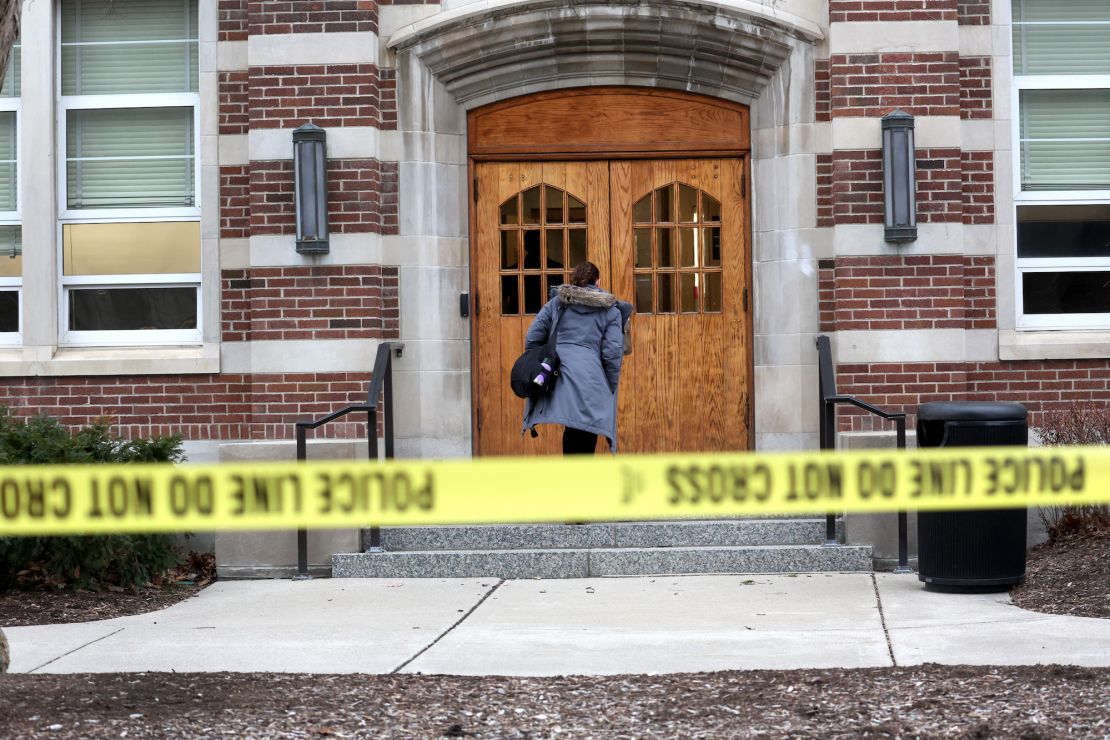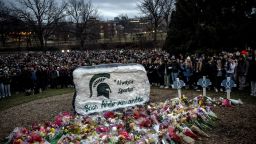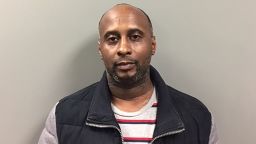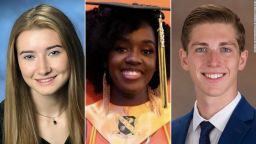After the Michigan State University community was paralyzed by a horrific mass shooting that killed three students, injured five others and halted campus activity, the school will begin to resume athletic and academic life, as many are still struggling to make sense of the tragedy.
Athletic events, some of which were postponed or canceled due to the shooting, are scheduled to resume this weekend and classes will recommence Monday, university officials announced.
“Athletics can be a rallying point for a community in need of healing, a fact many of our student-athletes have mentioned to me,” MSU Vice President and Director of Athletics Alan Haller said in a statement Thursday. “The opportunity to represent our entire community has never felt greater.”
Student athletes may opt out of participating, Haller said, explaining, “there are some who aren’t ready to return to athletic events. Those feelings are incredibly valid.”
All classes were canceled through Sunday and other activities suspended for at least two days after a 43-year-old gunman opened fire Monday evening on two parts of the campus. As they fled the deadly rampage, students leapt from smashed windows and ran to dorms as others sheltered in place for hours. Some students found themselves reliving a familiar nightmare, as they had survived another mass shooting just over a year ago.
One of the injured students was moved from critical to stable condition Thursday and the others remained in critical condition Friday, MSU Police confirmed in a tweet.
The conditions of the five students remains unchanged Friday, according to the university.
Berkey Hall, where Arielle Anderson and Alexandria Verner were killed, will remain closed for the rest of the semester, Woodruff said. The nearby student union, where Brian Fraser was killed, is also closed, she said, noting its reopening is still being evaluated.

But even as the campus transitions back to normal operations, community members like professor Marco Díaz-Muñoz are still working through the pain and shock of Monday night’s tragedy.
Díaz-Muñoz doesn’t want to return to Berkey Hall, where the gunman entered through the back door of his classroom and began firing at his Cuban literature students, injuring several and killing Anderson and Verner, he told CNN’s Miguel Marquez.
“It was like seeing something not human standing there,” he said, describing the masked gunman. After the shooter left the classroom, Díaz-Muñoz threw himself against one of the doors to block him from possibly reentering.
Some students were able to escape through the windows as others stayed behind to help the injured, using their hands to clamp down on the wounds, he said. “I’ve never seen so much blood.”
Two girls, who he later learned were Anderson and Verner, seemed to be in the worst condition and were “lying there in these pools of blood,” the professor said. He believes most or all of the injured students were in his classroom.
“I feel like I want to not remember these scenes and not have to go teach that class,” he said. “But there is another part of me that feels a great need, a strong need to see my students again … to see that they are alive, I need to see their faces.”
He is trying to write his students a letter, but is struggling with what to say.
‘Nothing in place’ to stop shooter’s weapon purchase, police say
The gunman, Anthony Dwayne McRae, was found by police about 4 miles from campus later Monday night after a tipster recognized his photo in the news and alerted authorities, according to authorities.
As police approached him, McRae shot and killed himself, said Michigan State Police Lt. Rene Gonzalez.
On his body and in his backpack, investigators found two legally purchased but unregistered 9mm handguns, several loaded magazines and dozens of loose rounds of ammunition, authorities said.
“He did purchase the gun legally. He was allowed to purchase the gun. There was nothing in place to prohibit him from purchasing a firearm,” MSU police interim Deputy Chief Chris Rozman said Thursday.
McRae was arrested in 2019 and charged with the felony of carrying a concealed weapon without a permit, and later pleaded guilty to a lower misdemeanor charge of possession of a loaded firearm as part of a plea deal, court records show.
But the lesser charge, negotiated down by a prosecutor, did not prohibit him from purchasing firearms in the future, Lansing Police Chief Ellery Sosebee said Thursday.
Investigators also found a note on McRae that listed other potential attack targets, MSU police confirmed. Two schools in New Jersey’s Ewing Township were on the list, police there have said, adding that there is no threat to the schools.
Other possible targets detailed in the note included a warehouse, an employment agency, a discount store, a church and a fast food restaurant, law enforcement officials who have access to the note told CNN.
“We found that he had had contact with some of those places,” Gonzalez said Thursday. He confirmed McRae had once worked at the warehouse, belonging to the Meijer supermarket chain.
“In a couple of other businesses, it appears that he’d had some issues with the employees there, where he was asked to leave,” Gonzalez said. It looked like McRae’s possible motive was that “he just felt slighted, and that’s kind of what the note indicated,” he said.
The businesses listed have been notified by law enforcement and told that the gunman is dead, law enforcement officials said.
Victims mourned as kind, dedicated students

The three students killed, two of whom are from the same Michigan hometown, included an aspiring doctor, a beloved fraternity president and a biology student from a close-knit town.
Fraser, 20, was the president of the Michigan Beta Chapter of Phi Delta Theta, the fraternity said in a statement.
“As the leader of his chapter, Brian was a great friend to his Phi Delt brothers, the Greek community at Michigan State, and those he interacted with on campus,” the statement said.
The fraternity and his parents have created a memorial scholarship in Fraser’s honor, in the hopes that recipients “will embody Brian’s charismatic, contagious smile and caring, loyal energy,” Phi Delta Theta announced.
Fraser, a sophomore, and Anderson, a junior, were both from the Detroit suburb of Grosse Pointe, Michigan.
Anderson, 19, was a “remarkable student” studying to become a doctor, her aunt Chandra Davis said in an Instagram post.
“She was working diligently to graduate from Michigan State University early to achieve her goals as quickly as possible,” the family said in a statement. “As an Angel here on Earth, Arielle was sweet and loving with an infectious smile that was very contagious. We are absolutely devastated by this heinous act of violence upon her and many other innocent victims.”
Verner, 20, was a junior at the university studying biology, according to The State News.
“Her kindness was on display every single second you were around her,” family friend Billy Shellenbarger told CNN. He has known Alexandria, or Alex, as he called her, since she was in kindergarten.
In her hometown of Clawson, Michigan, Verner was a student leader and fantastic three-sport athlete in volleyball, basketball and softball, said Shellenbarger, who is the Clawson Public Schools Superintendent.
“To lose her on this planet, let alone our small community, it’s tough,” he said. “And it’s going to take a while to recover, but to have known her for the duration of time that we all have, once again, is a gift to all of us.”
CNN’s Miguel Marquez, Meridith Edwards, Jacob Lev, Christina Zdanowicz, David Williams, Michelle Watson, John Miller, Nouran Salahieh, Holly Yan and Sara Smart contributed to this report.









